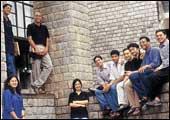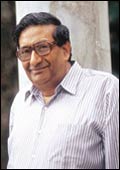|
|
| Interim director Prakash Apte, centre, with
his students on the IIMB campus |
"Aiming
low," declares Rammohan Rao, leaning back on a sofa at his
home in Bangalore's Fraser town, "is a crime." It's a
borrowed phrase, but just the same it aptly describes what Rao has
tried to do over the last five years as the director of IIM Bangalore
(he stepped down in past May after a three-month extension, and
Professor of Economics Prakash Apte is holding the fort). And that
is to set one stretch target after another, in his bid to transform
a b-school originally mandated to churn out managers for state-owned
enterprises into India's top-most institution for managerial talent.
The first part of Rao's turnaround effort (See
Business Today November 21, 2000) saw the school put its house in
order. Its professors doubled up as managers and launched a number
of management initiatives-right from benchmarking to scenario planning
to business process re-engineering. The result: recruiters, who
for long had perceived the school as an also ran compared to its
rival in Ahmedabad, accorded it a new respect. For the first time
this year, IIMB's graduating batch snagged a higher average (rupee)
salary than its peer in IIMA (the latter, however, received a far
higher average dollar salary).
More importantly, some recruiters are actually
beginning to see IIMB's apparent lack of 'specialisation' as a virtue.
For example, IIMA is perceived to churn out better marketers and
general managers and IIMC, in systems and quantitative techniques.
Says Guhesh Ramanathan, an alumnus of IIMB and CEO of PortablesRus.com,
an e-services company for mobile computing users: "Although
some would identify IIMB with finance and economics, the fact remains
that it has plus points in all the areas."
Now, Rao-he has just one year left at IIMB-is
raising the bar even higher. In another five years, and latest by
the end of the decade, he wants IIMB to establish itself as the
pre-eminent management institution in the whole of Asia Pacific.
And by 2020, be counted among the world's top 10 or, at least, 20.
Says Rao, a recipient of the prestigious D Ray Fulkerson Prize for
mathematics: "Just like Indian industry, Indian institutions
have been inward looking. But it's obvious that we will start facing
competition from foreign universities in the near future."
|
IIMB'S GLOBAL INITIATIVES
|
International Business in
Practice: An elective course, it requires students to spend
about two weeks on a project hosted by a company in Asia.
Centre for Practising Management: To be
launched in 2003, the Centre will collaborate with global universities
and offer an Executive MBA programme.
Exchange Programme: Tie-ups
with 23 business schools world wide allows IIMB students to
spend a term at any of these schools.
Culture Transfer: The ongoing arrangement
with St. Gallen, Switzerland, is to be extended to several other
B-schools in Asia.
Research: The faculty is
focusing on collaborative research with foreign B-schools, with
the aim of building greater credibility in Asia Pacific.
Goal: In another five years or so, IIMB
wants to establish itself one of the top-most management institutions
in Asia Pacific. |
Bangalore To Bangkok
Some of the reasons why IIMB has sharpened
its edge over the years, are rather apparent. First and foremost
is its location itself. With Bangalore becoming a hub for new economy
companies, IIMB has been able to get the best of visiting faculty
from the industry and also some big-time recruiters. Second is the
fact that the school-unlike IIMA, which, its critics say, has been
resting on its oars-has been pushing itself to reach the top slot.
It has been trying out new things with its curriculum and teaching
methodology-or pedagogy, as the school calls it. Says Lokendra Tomar,
an IIML alumnus and founder of coolavenue.com, which partners with
BT for survey of placements at top b-schools: "IIMB students
give you a feeling of wanting to go out and prove themselves."
Not surprising then that one of the recent classes on ethics did
not feature a lecture at all. Instead, the students were shown The
Insider, a movie starring Al Pacino and Russell Crowe that portrays
the real life story of a cigarette company Vice President who blows
the whistle on his firm's nefarious practices.
The growing recognition has encouraged IIMB-which
now boasts of a biometric-based attendance register for its faculty-to
test its brand appeal internationally. For the last three years,
it has been going on roadshows to countries like Singapore, Hong
Kong, and Bangkok to woo foreign students. Last year, the school
focused on Bangkok and Singapore, made seven offers, but only three
students (all of Indian origin) joined. Says Geetika Kapoor, one
of them: "I could have studied at any other foreign university,
but I know that IIMs, particularly IIMB, is as good as any of them.
Adds Kristjan Kull, an exchange student from the Helsinki School
of Economics, who had the option of going to IIMA: "I chose
IIMB because of the reviews I had read, and especially because of
its faculty strength in finance and economics."
|
BEYOND BUSINESS
|
 |
Prof. Chiranjib Sen
Chairperson, Centre for Public Policy |
In 1997, when IIM-B drew up its
vision statement, it said "excellence through partnership".
Since then school has partnered with both industry and business
schools abroad. The one with the local software industry led
to the setting up of a part-time course in software enterprise
management, the only of its kind in the IIM network. A more
recent partnership with the Department of Personnel and Training
and UNDP has led to the setting up of a Centre for Public Policy.
The full-time, 11-month programme is aimed at mid-career civil
servants. Says Prof. Chiranjib Sen, Chairperson of the Centre:
"The idea is to allow the government to be much more responsible,
flexible, and innovative in its policy approach." When
BT visited the Centre, the first batch, comprising 28 mid-career
bureaucrats, was already undergoing training. Sen says that
eventually, the school would like to get into an MDP mode (read:
executive education), with short and long-term courses. |
It's unlikely that the number of foreign students-either
at IIMB or any other IIM-will ever be significant. For one, their
MBA programmes are quant heavy and emphasise too much on theoretical
learning. Most international students, in contrast, look for a broader
exposure to management. As a concession, IIMB already allows foreign
students to take the Graduate Management Admission Test (GMAT) instead
of the common admission test (cat). While that may help entry, it
doesn't in any way prepare them for the academic rigour. Besides,
as Abhoy Ojha, Associate Professor and in charge of the admissions
committee points out, "just to get international students,
we can't compromise on admission quality."
The need for school's globalisation, as IIMB
calls it, is not in question though. Over the last two years, the
school-it will soon roll out an ERP system to, among others, speed
up turnaround time to queries-has been looking for ways increase
the international exposure of its students. In 2001, it introduced
an elective course called international business in practice (IBP)
that offers a mix of classroom and field study. Each student is
expected to spend two weeks in an Asian country, and work on a project
hosted by an international company. Last year, 40 students and four
professors participated in the IBP, working on projects at companies
such as Digital Equipment (Singapore), Thai Board of Trade, and
Ranbaxy (Thailand). By 2003, the school hopes to ramp up the numbers
to 80 and eight, respectively. Says Benoy Ravindran, a mechanical
engineer from IIT Kharagpur, who is doing a PGDM in finance at IIMB:
"As the economy opens up even more, exposure to international
markets will be an added advantage."
 |
| This is where some of India's best managers
are made |
 |
| Prof. Rajluxmi Murthy with exchange students
from overseas |
 |
| This lucky bunch will work on projects in some
Asian countries |
Another area where IIMB is putting a lot of
emphasis is cultural transfer. Last year, 20 students partook in
the Asian Culture Transfer hosted by the University of St. Gallen,
Switzerland. This kind of partnership is to be extended to others
business schools in Asia. Says Rajluxmi Murthy, Assistant Professor
of Quantitative Methods and Information Systems, and head of the
exchange programme: "We are hoping that such initiatives will
help our students get a first-hand experience of globalisation,
and sensitise them to some culture-specific management issues."
Rao and Apte (when BT went to press, a government
appointed committee had shortlisted candidates for the post, and
Apte was one of them) realise that taking IIMB global would involve
much more than student exchange and overseas projects. The school's
edge will necessarily be cut by its faculty.
Research, consultancy, and writing of papers
for leading management journals are being pushed with renewed vigour.
For example, IIMB already collaborates with the Oslo University,
and similar arrangements are to be worked out with some institutions
in Singapore. Says Rao: "Asia Pacific is a fairly competitive
region, and we have to publish in international journals to establish
ourselves firmly it."
For almost seven years now, IIMB has been offering-along
with the University of Lancaster, McGill, insead, and a consortium
of Japanese universities-an International Masters Program in Practising
Management (IMPM). The idea now is to turn that into a Centre for
Practising Management and offer post MBA programmes, or executive
MBAs. The details are still being worked out, but the school wants
to kick-off the programme by next year. Points out J. Ramachandran,
BOC Professor of Business Policy at IIMB: "Over the past few
years there has been a much more active engagement of our customers
and partners. Our offerings are structured according to our customers'
needs."
 |
DR RAMMOHAN RAO
"We want to be one of the best B-school
in Asia." |
 |
| Mid-career civil servants studying at the
Centre for Public Policy, enjoy a tea break on the campus |
That, in fact, is happening with the school's
staple too: the post graduate programme (read: MBA). Two years ago,
as part of its benchmarking exercise, the school made some changes
in its curriculum. The number of courses was slashed from 24 to
18, and credits in the first year lowered from 56 to 48, and in
year two to 45 from 49. Explains Janat Shah, Professor of Production
and Operations Management, and part of the team that did the benchmarking:
"Under the old curriculum, the emphasis seemed more on evaluation
than learning. Ever since we made the changes, there's been an increase
in the extra-curricular activities of our students."
To factor in the slump in tech and finance-and
the general uncertainty in industry-the school has introduced orientation
and reorientation sessions. The former is held at the beginning
of the first year, and the latter at the beginning of the second
year.
The idea is to review performance in the first
year and assess the student's aptitude. Based on that, the students
are advised on a course of action. A Bangalore-based company Eduquity
helps the students carry out the self-assessment.
Ranjan Acharya, Corporate VP (HRD), Wipro,
who has been watching the changes at IIMB closely, says that all
the IIMs are good, "but what sets apart IIMB is the strength
of its faculty and students, especially in the area of strategy."
Just like a corporation, though, a B-school's future is shaped by
the man in charge. The Ministry of Human Resources has taken it
upon itself to appoint the directors at the IIMs, predictably raising
their hackles. As long as the appointees turn out to be talented
academics, there shouldn't be any issue. If political considerations
outweigh merit, then the global rise of schools like IIMB and IIMA
may well be reversed.
1
2 3
4 5
|

